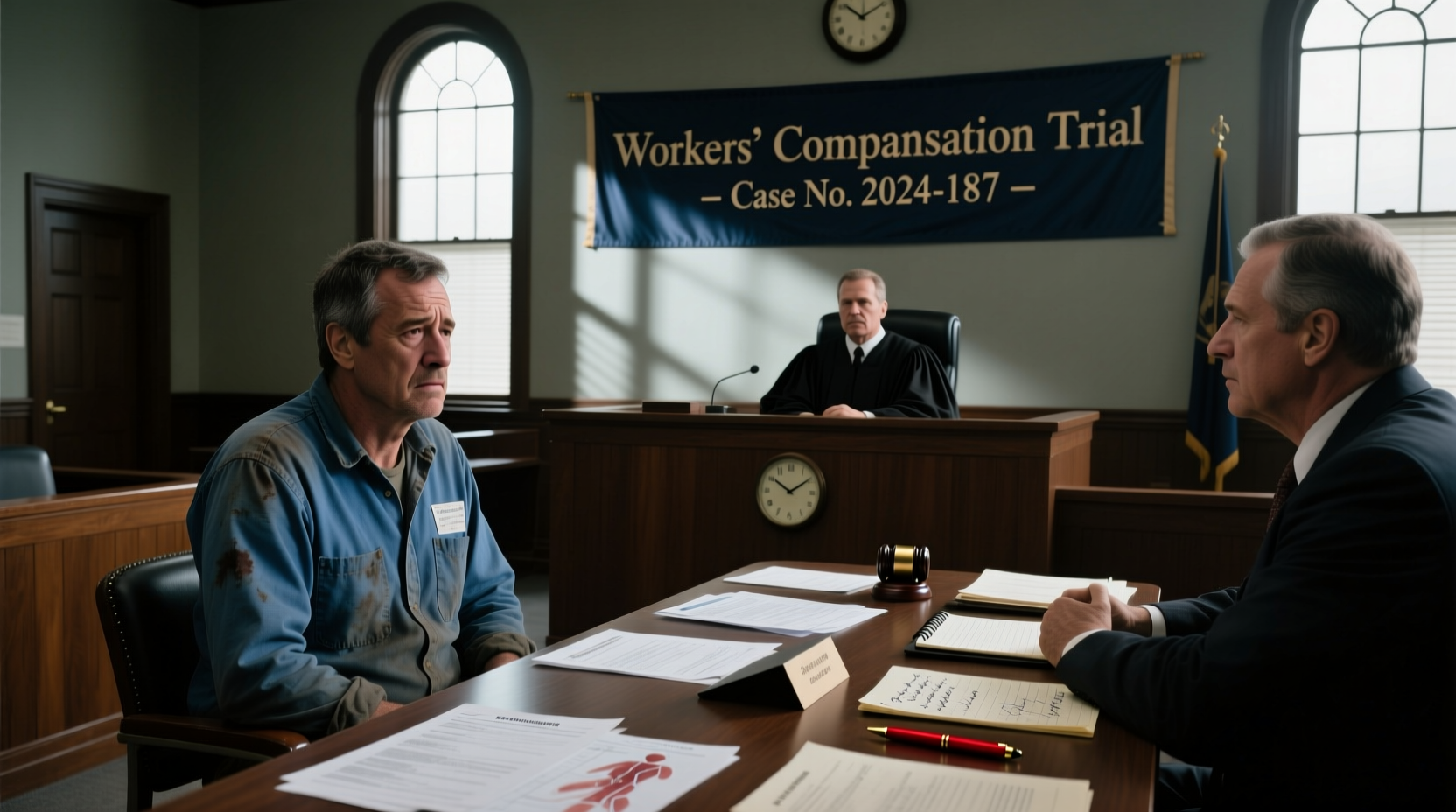Workers’ compensation is designed as a no-fault system—meant to provide medical benefits and wage replacement to injured employees without the need for litigation. In most cases, claims are settled quickly and without dispute. But not every claim goes smoothly. When disagreements arise between an injured worker and their employer or insurer, the matter may escalate to a formal hearing or even a full workers’ comp trial. Understanding why this happens—and what it means for you—is critical if you’re navigating a complex injury claim.
When Settlement Fails: The Path to Trial

The workers’ comp process typically begins with a claim filed through your employer’s insurance carrier. If accepted, you receive medical treatment and partial wage benefits. However, when the insurer denies your claim, disputes the severity of your injury, or stops benefits prematurely, you have the right to challenge that decision. Most states require administrative hearings before a workers’ compensation judge before any case can proceed to a broader legal trial. These hearings function like mini-trials, complete with evidence, testimony, and legal representation.
Trials—or formal contested hearings—usually occur only after all informal negotiations fail. Common triggers include:
- Denial of initial claim
- Disputes over disability classification (temporary vs. permanent)
- Disagreements about return-to-work timelines
- Challenges to the extent of impairment
- Allegations of pre-existing conditions
While the goal of workers’ comp is to avoid courtroom battles, some cases demand judicial intervention to ensure fairness.
Common Reasons Your Case Might End Up in Court
1. Disputed Causation of Injury
One of the most frequent reasons for litigation is whether the injury truly occurred on the job. Employers or insurers may argue that the condition developed over time due to personal factors, prior injuries, or non-work activities. For example, a warehouse worker with a back injury might face pushback if they had a prior history of lumbar issues. Proving that the workplace incident was the “major contributing cause” often requires expert medical testimony.
2. Benefit Termination or Reduction
If your benefits are suddenly cut off while you’re still recovering, you have the right to contest it. Insurers sometimes rely on independent medical exams (IMEs) that contradict your treating physician’s assessment. A trial may become necessary to determine whose evaluation holds more weight under state law.
3. Permanent Disability Classification
Determining whether an injury results in temporary or permanent disability can drastically affect compensation. Disputes often arise when doctors differ on impairment ratings. In such cases, a judge must weigh the evidence and assign a legally recognized level of disability.
4. Return-to-Work Conflicts
Employers may offer modified duty positions before you feel ready. If you refuse, they might argue you’ve abandoned your job or recovered sufficiently. But if the offered role exceeds medical restrictions, you may have grounds to challenge it in court.
5. Retaliation or Bad Faith Practices
In rare but serious cases, employers discourage claims through intimidation or retaliation. While workers’ comp laws prohibit firing someone for filing a claim, proving retaliation often requires a separate civil lawsuit. However, patterns of bad faith by insurers—such as delaying payments without justification—can also lead to escalated proceedings within the comp system.
“Many workers assume that filing a claim guarantees benefits. But when insurers challenge medical necessity or causation, the burden shifts to the employee to prove their case—often in a formal hearing.” — Laura Mendez, Workers’ Compensation Attorney with 18 years of experience
What to Expect During a Workers’ Comp Trial
A workers’ comp trial isn’t like a criminal or civil jury trial. It’s typically held before a single administrative law judge specializing in labor and disability claims. The process varies slightly by state, but generally follows this timeline:
- Filing a petition for hearing: After a denial or dispute, you must file a formal request with your state’s workers’ comp board.
- Discovery phase: Both sides exchange medical records, depositions, and witness lists.
- Pre-hearing conferences: Judges may attempt mediation to resolve issues before trial.
- Trial/hearing: Live testimony from the injured worker, doctors, vocational experts, and supervisors. Evidence is presented and cross-examined.
- Ruling: The judge issues a decision, which may be appealed by either party.
Proceedings are less formal than traditional court, but legal representation significantly improves outcomes. According to a 2022 study by the National Council on Compensation Insurance (NCCI), claimants with attorneys receive, on average, 3.5 times more in benefits than those who represent themselves.
Checklist: Preparing for a Workers’ Comp Hearing
If your case is moving toward trial, use this checklist to strengthen your position:
- ✅ Gather all medical records related to the injury
- ✅ Obtain written statements from coworkers who witnessed the incident
- ✅ Secure a detailed report from your treating physician supporting work restrictions
- ✅ Review your job description and duties at the time of injury
- ✅ Compile a log of lost wages and out-of-pocket medical expenses
- ✅ Consult with a workers’ comp attorney to evaluate your case strength
- ✅ Prepare to testify clearly and factually—avoid exaggeration
Do’s and Don’ts During a Contested Claim
| Situation | Do | Don’t |
|---|---|---|
| Communicating with the insurer | Keep records of all calls and letters; respond promptly | Volunteer extra information or speculate about your condition |
| Attending an IME | Arrive on time, dress appropriately, answer questions honestly | Argue with the doctor or assume the exam is unnecessary |
| Posting online | Stay private; avoid discussing your case publicly | Post photos of physical activity that could contradict your limitations |
| Returning to work | Follow your doctor’s restrictions strictly | Accept duties that exceed your approved limitations |
Real Example: Maria’s Road to a Fair Settlement
Maria, a nursing assistant in Ohio, slipped on a wet floor while helping a patient transfer. She reported the fall immediately and was diagnosed with a herniated disc. Her employer’s insurer initially approved her claim but stopped benefits after six weeks, citing an IME that claimed her symptoms were inconsistent with the injury.
Maria’s doctor disagreed, noting progressive nerve damage shown on MRI scans. With the help of a workers’ comp attorney, she requested a hearing. At trial, both physicians testified. The judge ruled in Maria’s favor, restoring her benefits and approving surgery. The case took eight months from dispute to resolution—but without the trial, she would have lost critical income during recovery.
Her story underscores a key truth: when insurers rely on biased evaluations, the courtroom becomes the last line of defense for fair treatment.
Frequently Asked Questions
How long does a workers’ comp trial usually take?
The timeline varies by state and caseload, but most contested hearings are scheduled within 3–6 months of filing a petition. The actual trial may last one day or stretch over several sessions, especially if medical experts are involved. Final decisions are typically issued within 30–60 days after the hearing concludes.
Can I sue my employer instead of going through workers’ comp?
In most cases, no. Workers’ comp is considered the “exclusive remedy” for workplace injuries, meaning you can’t sue your employer for pain and suffering—even if they were negligent. Exceptions exist for third-party liability (e.g., defective equipment made by another company) or intentional harm, which may allow a civil suit alongside the comp claim.
What if I lose the trial?
You can appeal the decision, usually to a higher board or appellate court within the workers’ comp system. Appeals must be filed within strict deadlines—typically 14 to 30 days. An experienced attorney can help determine whether new evidence or legal errors justify an appeal.
Final Thoughts: Protecting Your Rights Through Legal Action
No one starts a workers’ comp claim expecting to go to trial. But when benefits are denied unfairly or medical evidence is challenged, standing up for your rights may require a formal hearing. The system is built to resolve disputes efficiently, but it only works if injured workers are informed, prepared, and willing to advocate for themselves.
Documentation, medical consistency, and legal guidance are your strongest tools. Whether your case settles early or proceeds to trial, understanding the process empowers you to make better decisions every step of the way.









 浙公网安备
33010002000092号
浙公网安备
33010002000092号 浙B2-20120091-4
浙B2-20120091-4
Comments
No comments yet. Why don't you start the discussion?